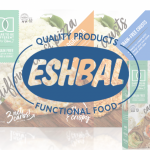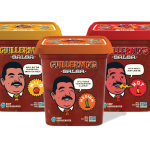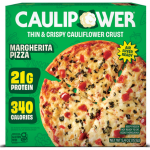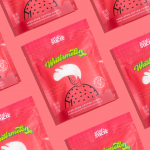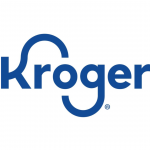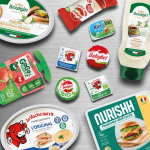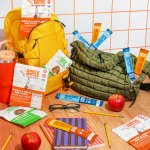Kevin’s Natural Foods Aims to Fill Need for Paleo Meals
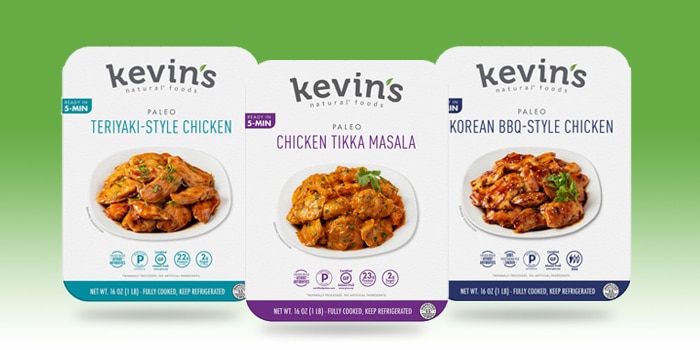
Though the paleo diet has gained traction in categories such as sauces and snacks, there’s still space for convenient, clean meal options. Kevin’s Natural Foods wants to help fill that need to via a line of ready-to-eat, refrigerated paleo meals.
After starting in 2012 as meal kit company Chefs’ Menu, the company found that consumers really wanted clean meals they didn’t have to cook at all. Despite seeing modest success in its private label and branded meal kits, last August the Stockton, Calif.-based brand relaunched as Kevin’s with a line of sous-vide entrees as well as sauces and seasonings. The brand, which is owned by investment company Innov8 Partners, has since landed in 4,000 stores, with plans to expand further in the coming months.
The meals are sold in the refrigerated section of stores. Kevin McCray is the brand’s cofounder and CEO, and is also the COO of Innov8, a holding company that also owns three apparel brands.
McCray was able to scale the brand quickly over the past year using resources and connections from Innov8 CEO Dan Costa, who previously worked in the food business, McCray said.
One advantage that Kevin’s maintains is its own production facility, purchased last year after the brand relaunched. It’s been a boon during the pandemic, when some brands have struggled to meet the rapid uptick in demand. During the pandemic, he noted, some retailers increased their orders three or four-old due to meat shortages.
“Putting manufacturing into place early [gave us] the ability to ramp and scale up as we need to,” McCray said. “As a new company, we proved we were a serious supplier.”
Innov8 is for now “laser-focused” on Kevin’s as its bet in the food industry, McCray said. The brand is based on McCray’s personal experience with an auto-immune disorder that was improved by following the paleo diet. For a decade, McCray said, he felt like a “total outlier” in seeking paleo-friendly foods, but in 2019 decided the diet “wasn’t weird anymore.” Although there were plenty of paleo snacks from jerky to candy to meet the consumer demand, there was a hearty helping of white space at mealtime, he noted.
“It’s a category that’s growing and drastically underserved,” he said. “For 10 years I had been eating the same foods.”

Though the idea for Kevin’s is similar to the previous meal kit business, the offering differs. While Chef’s Menu still required some preparation, cutting and longer cooking times, Kevin’s only contains a pouch of pre-cooked chicken and a sauce (Thai Coconut-Style, Teriyaki-Style, Korean BBQ-Style, Cilantro Lime, Chicken Tikka Masala, Chipotle Lime, Lemongrass and Roasted Garlic Chicken). The two elements are heated and combined for a complete meal.
McCray noted that the meal kit category is a great concept but “there’s a lot that has to be done to it.” For example, there’s a “disconnect” between curating ingredients and helping a consumer prep them: often, he said, consumers simply “run out of time” to actually cook their meal kits. Additionally, pre-cutting raw meat and vegetables does yield more convenience for consumers but results in a shorter shelf life. There are more challenges at retail: for example, there’s no set place for meal kits in stores, making it difficult for customers to find them.
At the same time, he said, consumers still want convenience, and meat and vegetables are the hardest things to cook. Kevin’s meals gives consumers that “substantial culinary shortcut” while solving much of what meal kits aimed to do, he said.
Using precooked meat was a “tall order,” McCray said, because it can easily dry out. To solve this problem the company utilizes the sous-vide technique (a low temperature, long cook) which is easy to scale with the right equipment and gives the customer several ways to reheat: boil in a bag or sauté.
Growth has been steady since launch. The brand first launched in Bay Area Costco stores last August, before expanding into all Costco locations; in February it launched its own ecommerce platform and expanded into Whole Foods, which will add three more meal SKUs this fall, and into HEB, Raley’s Supermarkets, Schnucks, and Save Mart. In stores, the entrees retail for $9.99; condiments and seasonings retail for $5.99 and simmer sauces for $3.99; the latter comprises only about 10% of the brand’s sales since center store sees slower turns, he said.
The meals are sold in the refrigerated prepared entree section in stores; aside from its paleo focus it deploys a white, stark packaging to catch the consumer’s eye. Although the meals can be made from frozen (online orders are shipped frozen) and then slacked out, the refrigerated set allows the brand to provide a ready-to-cook fresh product that still has a 60 day shelf life. Grocery retailers, he said, are also investing to “refresh” the section.
“Right now the prepared entree section has just been one-dimensional,” McCray said. “I can see a future where it gets more vibrant and cleans up to match the rest of the store.”
Despite the current carnivorous focus, the company is aware of the hunger for plants: Costco is testing a sous-vide cauliflower side dish that can be pan seared and served with a sauce. The brand has plans to innovate further with the vegetable, which provides a neutral “canvas” for sauces, launching a sous-vide microwaveable riced cauliflower this fall.
“Plants are very important to us; the early indicators are that we need to figure out how to get more plants to people,” he said. “We’re still trying to figure out the supply chain.”
The company also hopes to expand its direct-to-consumer business. Though shipping costs for frozen items can be high, the brand is working to achieve better margins by rewarding consumers for making larger orders. In its current model, 4-5 entrées retail for $15.99 per entree; 6-7 entrées retail for $12.50 per entree and 8 or more entrées retail for $11.25 each.
“The sweet spot was if you can get a loyal customer base that likes this stuff, you can get people to buy more at one time and give them a better price,” McCray said.
